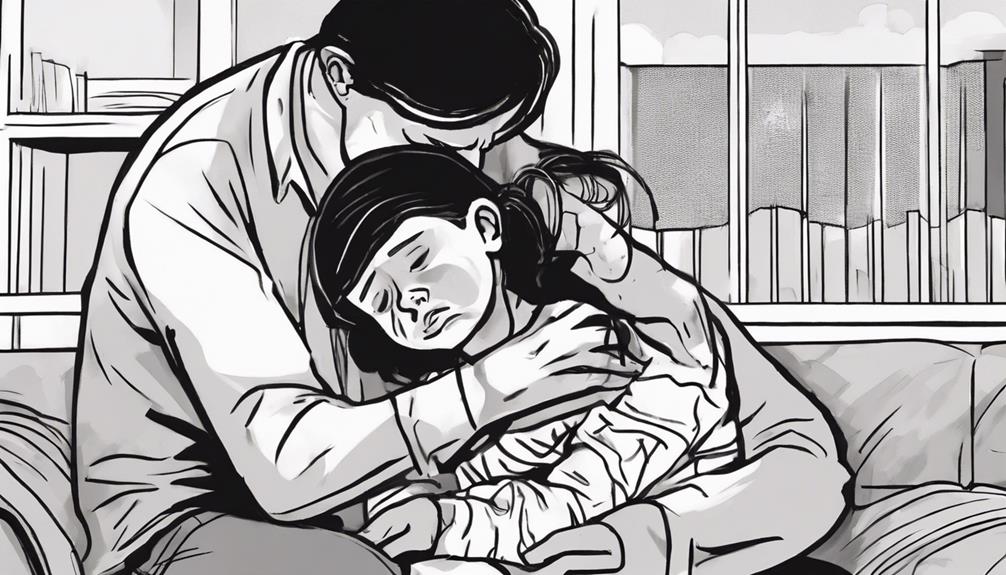Growing up creates the blueprint for future parenting, blending past experiences with fresh decisions. Childhood memories influence interactions, reflecting in how families are raised. Recognize and break old, negative habits to foster a joyful environment. **Nurture love** by offering emotional support, celebrating achievements, and maintaining open conversations. Make wise choices by empathizing, listening attentively, and encouraging positively. Early experiences leave a mark—**harness them** for your family’s well-being.
Key Takeaways
- Upbringing shapes parenting style through learned behaviors and coping mechanisms.
- Childhood experiences influence communication style and emotional responses in parenting.
- Understanding childhood experiences aids in developing effective parenting strategies.
- Parent-child relationship dynamics often mirror behaviors learned in childhood.
- Self-reflection on upbringing provides insights into one's own parenting style.
Influence of Childhood Experiences
Your upbringing shapes how you parent today, with childhood experiences exerting a significant influence on your parenting style and behaviors. The way you were raised impacts how you interact with your own children and the strategies you employ in nurturing them. The parent-child relationship you'd as a child often serves as a model for the relationship you establish with your own kids.
Childhood experiences can mold your parenting style in various ways. If you were raised in an environment where communication was open and positive, you might tend to adopt a similar approach with your children. Conversely, if your childhood was marked by strict discipline, you might find yourself mirroring those methods when raising your kids.
Research shows that understanding your childhood experiences is vital in shaping effective parenting strategies. By reflecting on your upbringing, both the positive and negative aspects, you can consciously choose which elements to incorporate into your own parenting style. Remember, childhood trauma and positive experiences alike play a role in influencing how you parent your own children.
Patterns and Parenting Style

The connection between childhood experiences and parenting styles is evident in how individuals often mirror the styles used by their own parents, with four main styles – authoritarian, authoritative, permissive, and uninvolved – reflecting these influences. Your upbringing plays a significant role in shaping your approach to parenting. Reflecting on your childhood experiences and the parenting styles you were exposed to can provide valuable insights into your own parenting style.
By understanding the positive and negative aspects of your parents' approach, you can make informed decisions about the type of parent you want to be. Self-reflection is key in recognizing patterns and motivations in your parenting behavior. Research emphasizes the impact of constructive parenting practices across generations, highlighting the importance of mindful parenting.
Breaking Harmful Cycles

Breaking harmful cycles in parenting involves recognizing and addressing negative patterns learned from childhood experiences. Growing up in an environment where parental substance use was prevalent can impact your parenting style.
Research in Developmental Psychology shows that early childhood experiences greatly influence how you interact with your own children. To break this cycle, focus on building strong relationships with your kids. Create a positive home environment filled with love, support, and clear boundaries.
By prioritizing quality time together and engaging in bonding activities, you can help break the negative patterns passed down through generations. Reflect on your past experiences and make intentional choices to guarantee your children have a different upbringing.
Implementing conscious parenting practices is key to breaking the cycle of maladaptive treatment. Remember, fostering emotional connections and setting boundaries are essential steps in breaking harmful cycles and creating a healthier family dynamic.
Creating a Supportive Environment

Establishing a nurturing environment involves fostering positive relationships with your children based on their individual needs and personalities. As a parent, creating a supportive space during Early Adolescence is vital for your child's mental health and development. By providing emotional support, encouragement, and validation, you can cultivate a sense of security and trust in your relationship with your child.
Actively listening, showing empathy, and maintaining open communication are key aspects of building a supportive environment. These practices help you understand and address your child's feelings and concerns effectively.
Encouraging independence and autonomy within a safe and supportive environment allows your child to develop confidence and resilience. A supportive space also promotes healthy emotional regulation, problem-solving skills, and positive self-esteem in children.
Conscious Choices in Parenting

Engaging in mindful decision-making shapes your parenting approach, fostering a nurturing environment rooted in self-awareness and reflection. Being conscious of your triggers and past experiences can empower you to make informed choices that positively impact your child's development.
According to *Psychology Today*, conscious parenting involves breaking free from automatic reactions learned early in life and opting for understanding instead of punishment.
To enhance your conscious parenting journey, consider the following emotional cues:
- Acknowledge your own emotions and triggers before responding.
- Practice active listening to understand your child's perspective fully.
- Create a safe space for open communication and expression of feelings.
- Use positive reinforcement and praise to encourage desired behaviors.
- Seek support from parenting resources and communities to continue growing in your conscious parenting journey.
Frequently Asked Questions
How Does Your Upbringing Affect Your Parenting?
Your upbringing profoundly shapes your parenting style. The way you were raised influences how you interact with your own children.
Understanding your childhood experiences helps you grasp why you parent the way you do. Positive or negative impacts from your past guide your parenting decisions today.
How Does Your Upbringing Impact Who We Are?
Your upbringing shapes who you are in profound ways. From the values you hold dear to the way you navigate relationships, childhood experiences leave a lasting imprint on your identity.
Whether you grew up in a supportive environment or faced challenges, those early years mold your beliefs and behaviors. Understanding this impact can empower you to break free from negative patterns and cultivate a positive environment for your own family.
How Does a Child's Upbringing Affect Their Development?
Your upbringing plays a significant role in shaping who you become. Positive experiences like love and consistency can lead to healthy development.
On the flip side, childhood trauma or neglect can have lasting effects on mental health and behavior.
The way you were raised influences how you parent your own children, affecting their growth and well-being.
Understanding these impacts helps break harmful cycles and fosters positive development in the next generation.
How Did the Parenting Style You Were Raised in Affect You?
Growing up in a nurturing home can shape your parenting style positively, emphasizing warmth and clear communication. Conversely, a strict upbringing may lead you to enforce rigid rules. Your childhood experiences influence how you view authority, boundaries, and empathy in parenting.
Reflecting on your upbringing offers insights into your adult behaviors and relationships with your children. Understanding these influences can help you navigate parenthood with awareness and intention.
How Does Your Upbringing Influence the Life Lessons You’ve Learned from Parenting?
Our upbringing plays a significant role in shaping the way we approach life lessons from parenting. The values, beliefs, and habits instilled in us during childhood greatly impact our parenting style and the lessons we pass on to our children. It’s a reflection of how we were raised.
Conclusion
In the end, it's fascinating to see how your own upbringing can shape the way you parent your children.
By recognizing the impact of your childhood experiences, you can make conscious choices to break harmful cycles and create a supportive environment for your family.
So next time you find yourself repeating a familiar pattern, remember that you have the power to make a difference and choose a different path.
Your past doesn't have to define your future as a parent.











